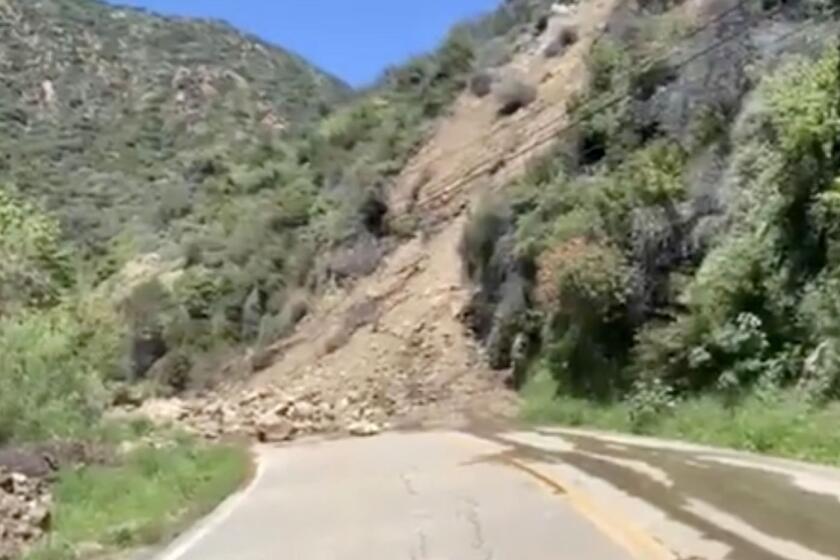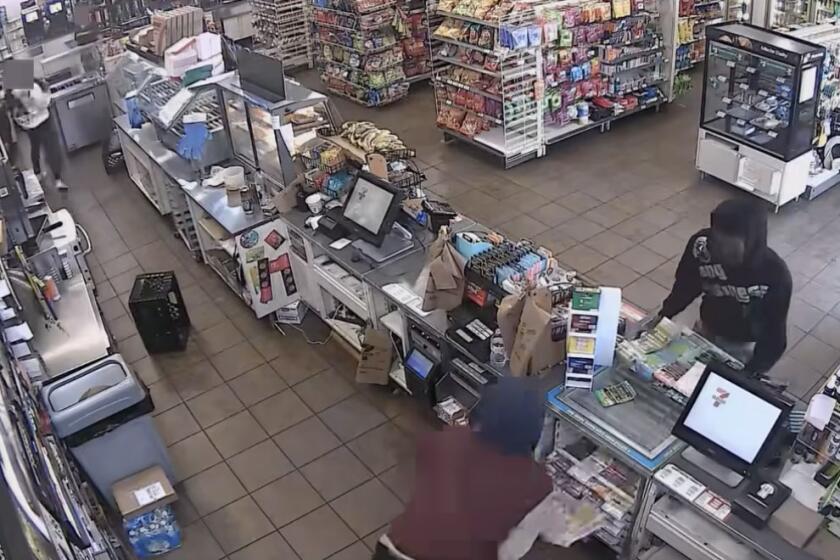Lost Souls Lose : Caltrans Prepares to Evict Squatters in Self-Styled City
In the City of Lost Souls, Hal Smith is the mayor, governing his people by common consent. But he doesn’t have the power to stop the bulldozers that are about to destroy his town.
Gilbert Nelles, the town judge, plans to call about a restraining order. But his legal knowledge is limited. And his tent has no phone.
Sheriff Carlos Arevalo has a more lavish dwelling--a two-room wooden bungalow with a bed, bookshelves and candles for light.
But the gold star on Arevalo’s chest doesn’t carry much clout with the California Department of Transportation. In a few weeks, the agency plans to reclaim the Golden State Freeway embankment on which the City of Lost Souls was built five years ago.
This hidden haven for drifters and the homeless, located along the Los Feliz Boulevard off-ramp near Griffith Park, has already dodged one demolition date. Caltrans and Los Angeles city officials delayed an eviction scheduled for Saturday to discuss other living accommodations for the dozen or so residents of the encampment.
But the Lost Souls don’t want to relocate.
Town treasurer Mary Waterman, 60, moved in more than a year ago after being mugged repeatedly in a rough section of Hollywood. “This is the safest place I’ve lived in during my life,” she said. “I have people looking out for me. I don’t know what I’d do if I had to leave here.”
The City of Lost Souls has eight permanent residents. About a dozen others stay for shorter periods. Many in the encampment say that they were led there by word on the street.
Walt Cloetta, 41, moved into the village about five years ago when he ran low on money and had trouble finding work. “We’re a happy community,” he said. “We try to take care of each other the best we can. We’d hate to be split up. We are a family.”
Homeless encampments on public property are not uncommon. But the City of Lost Souls, fittingly named by its founder, Mayor Smith, stands apart in several respects.
Using salvaged wood, some of its dwellers have built small, sturdy shelters, complete with doors and windows. Community members have set up their own government to maintain order. They share food, often cooked over a propane stove or barbecue grills, and decide whether newcomers can stay permanently.
“It’s quite an elaborate situation,” said Tom LaBonge, a field deputy for Los Angeles City Councilman John Ferraro, in whose district the settlement was built. “I don’t think there’s anything like it elsewhere in Los Angeles or maybe anywhere in California in an urbanized area. The way the buildings are developed, it’s like a little village.”
Yet it was LaBonge who recently told Caltrans about the City of Lost Souls, setting the stage for its apparent destruction.
He learned about the encampment from city firefighters, who stumbled upon it last October while extinguishing a small brush fire near the freeway. LaBonge said he was obligated to inform Caltrans.
“If I didn’t bring it to their attention, I would think I was not doing my job,” he said. “It wasn’t easy for me to do it. I tossed and turned about it.”
LaBonge said health and safety concerns were the deciding factor.
The encampment has no electricity or running water, and its “houses” hardly meet city codes. Residents said they use restrooms at nearby Griffith Park.
In the midst of heavy freeway landscaping, a wooden arch forms the entryway to the City of Lost Souls. The dirt clearing is neatly raked. Crude wooden houses stand on both sides of the central walkway. Several of the dwellings have signs in front, displaying the name and title of the person who lives there. Other community members have pitched tents, leaning knapsacks on trees and hanging clothes from branches.
The town walls are decorated with discarded posters and corroded street signs. Old shopping carts have been clustered off the main path.
In the center of the village is a communal dining area. Several residents were seated at the table on a recent afternoon, sipping beer, smoking cigarettes and munching pretzels. When a news photographer pointed a camera at the group, Sheriff Arevalo barked, “Put those beer cans down. We don’t want to have those beer cans showing.”
The Lost Souls say that they have gotten by just fine for five years before their discovery by state and city officials. They say that they keep their grounds tidy and discipline rule-breakers on their own.
By not bringing any attention to themselves, they hoped that city officials would not disturb the encampment.
“If there is any trouble, we hold a council meeting at the big, round table,” Nelles said. “The final decision is mine because I’m the judge.”
Nelles, 34, said he joined the community about three months ago after spending all of his money on a journey from the Yukon to Southern California. He has been trying to talk to top Disney executives about a marketing deal involving Canadian cartoon characters. But he complained, “The secretaries keep stalling me.”
Rene Melendez, 49, who has lived in the village intermittently for five years, said he is a veteran who served eight years in Vietnam. “I’ve got a family,” he said. “But I’d rather be here. I like to drink and smoke, and they don’t approve of it.”
State officials, worried about liability issues, insist that the Lost Souls must move.
“They are within our right of way, and we are legally responsible,” said Caltrans spokeswoman Margie Teritilli. “We’re responsible if there were to be an accident. By ‘us,’ I’m saying the taxpayers would be responsible.”
City and Caltrans officials met this week and agreed to send counselors to the site Tuesday to inform the Lost Souls about the assistance programs available to the homeless. A few days later, Caltrans crews will begin cutting down the vegetation and demolishing the structures, said LaBonge, who attended the meeting.
The encampment, hidden by thick freeway landscaping, cannot be seen by passing motorists on Los Feliz Road. But on Monday morning, its low-profile residents took their case public, posting large wooden roadside signs that read: “Save the City of Lost Souls.”
Caltrans crews quickly hauled off the signs, saying that they were illegal. Arevalo, the sheriff, angrily began painting a replacement sign. He believes that the village should be allowed to stay.
“It’s like squatter’s land,” he said. “They throw us out of here, then what are they going to do with it? Nothing. We’re not harming anything.”
The Lost Souls argued that government agencies knew about their village many months before the demolition order was handed down. They said Caltrans maintenance workers have given them bright orange trash bags, and Los Angeles Police Department officers have brought food at Christmas.
But Teritilli insisted that her department knew nothing about the encampment until LaBonge reported it. She said the trash bags may have been provided by law breakers who have been ordered to clean up the freeways to fulfill community service sentences.
Sgt. Ted Ashby of the Police Department’s Northeast Division said officers have been aware of the encampment but have taken no action to remove the residents. He said he knew of no serious crime complaints involving its residents.
Mayor Smith said he founded the City of Los Souls on Nov. 17, 1985, hauling in wood aboard shopping carts, and gave the community its name.
“A lot of people who came here felt they that they were lost and needed some place to go to,” he said. “We’re glad to have them. They’re human beings, too.”
The rules are relatively simple: “No dope heads, liars, cheats or thieves,” the mayor said.
Smith, 63, said he was self-employed for many years as a painter and mover. Today he pushes a shopping cart through nearby Glendale, picking up cans and bottles. He recycles them for cash.
“I couldn’t collect much of anything from Social Security,” he said. “I couldn’t afford a hotel room, so I had to live in the weeds.”
Now he doesn’t want to abandon the community he helped carved out of those weeds. “I paid state taxes,” he said. “I’m homeless. I have a right to live on state land. It’s morally right.”
More to Read
Start your day right
Sign up for Essential California for news, features and recommendations from the L.A. Times and beyond in your inbox six days a week.
You may occasionally receive promotional content from the Los Angeles Times.






